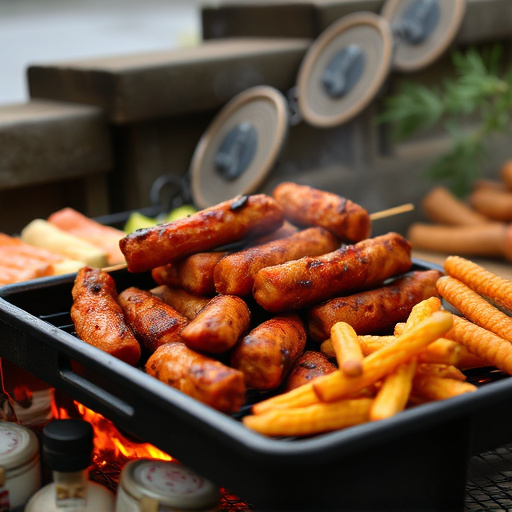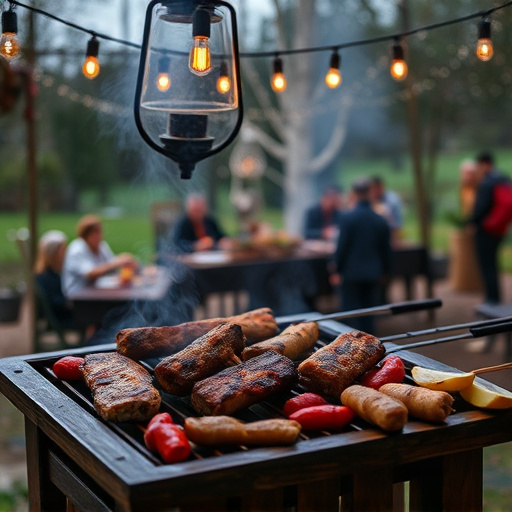Choosing the right ribs is crucial for a delicious BBQ rib recipe on your grill. Opt for high-quality, meaty pork ribs from local butchers offering fresh, grass-fed or organic options. Popular cuts include St. Louis-style and baby back ribs, each with unique cooking times and textures. Store ribs refrigerated until grilling and season simply with dry spices or add brown sugar, apple cider vinegar, and herbs for extra juiciness.
Looking for the perfect BBQ rib recipe to elevate your next backyard cookout? Discover the secrets to grilling mouthwatering ribs with our comprehensive guide. From choosing the right cut, like St. Louis-style or baby back, to mastering the art of seasoning and sauce, we’ll show you how to achieve tender, juicy ribs every time. Learn tips for preparing ribs before grilling, preheating your grill, and achieving that iconic crust that will have your folks licking their bones clean.
- Choosing the Perfect Ribs for Your Grill
- – Selecting the right cut of ribs: St. Louis-style vs. baby back ribs
- – Understanding rib quality and freshness
Choosing the Perfect Ribs for Your Grill

Choosing the right ribs is half the battle won when it comes to preparing a mouthwatering BBQ rib recipe for your grill. Opting for high-quality, meaty pork ribs is a great starting point. Look for ribs with a good marbling of fat, as this will help keep them tender and juicy during the cooking process. The most common types are baby back and spareribs; both are excellent choices for grilling due to their size and ease of preparation.
When selecting your ribs, consider their origin too. Local butchers often offer fresh, grass-fed options, ensuring a superior flavor. Additionally, choosing organic or free-range ribs can enhance the overall dining experience, especially when paired with your favorite BBQ sauce. Remember, the better the quality of your ingredients, the more satisfying the final dish will be for you and your backyard cookout guests.
– Selecting the right cut of ribs: St. Louis-style vs. baby back ribs

When it comes to choosing the perfect cut for your backyard cookout, there are two prominent options: St. Louis-style and baby back ribs. Both have their unique characteristics that make them suitable for BBQ rib recipes, but each offers a distinct grilling experience. St. Louis-style ribs, also known as “cut in between” or “spine-cut” ribs, are characterized by the removal of the membrane from the bone side, allowing for quicker cooking and easier access to the tender meat. This style is popular for its generous portions and the ability to achieve a crispy exterior while keeping the meat juicy inside.
On the other hand, baby back ribs are named after their smaller size and the fact that they come attached to the spine at one end. They require a bit more time to cook but offer a melt-in-your-mouth texture when prepared properly. Their distinct shape makes them ideal for slow-cooking over low heat on the grill, resulting in a tender, flavorful experience. Whether you prefer St. Louis-style or baby back ribs, these cuts are a staple at any backyard gathering, promising to satisfy your appetite with every mouthwatering bite of your BBQ rib recipe.
– Understanding rib quality and freshness

When it comes to ribs, quality and freshness are key to a delicious BBQ experience. Choosing the right cuts is essential for a tender and juicy result. Look for meaty, well-marbled ribs with a good layer of fat—this ensures they remain moist during the slow cooking process. Freshness is paramount; opt for high-quality, locally sourced ribs whenever possible. Proper storage is also vital. Keep your ribs refrigerated until you’re ready to grill, and avoid leaving them at room temperature for extended periods.
A good BBQ rib recipe should highlight natural flavors without overwhelming the taste buds. Simple dry rubbing spices like paprika, garlic powder, salt, and pepper are a great starting point. Allow the rub to adhere well, massaging it into the meat. For an extra moist texture, consider adding ingredients like brown sugar or apple cider vinegar to your marinade. Fresh herbs like rosemary or thyme can also lend subtle aromatics that complement the smoky flavor from the grill.
